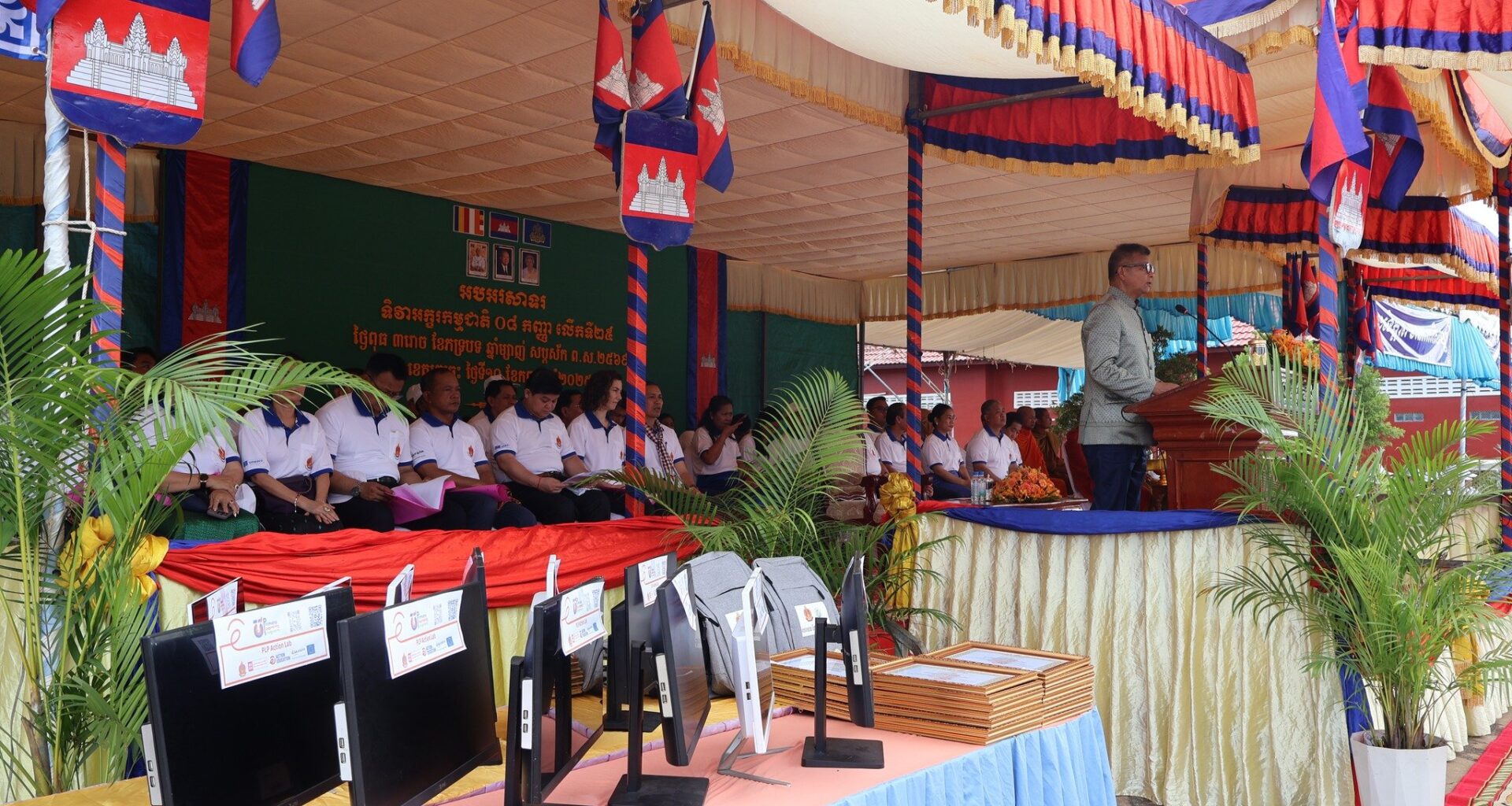Aide et Action (AEA) Cambodia and Education Above All Foundation (EAA) donated 195 computers to 10 Life Learning Centers to help children and youth gain digital skills in line with the digital era. Photo from Aide Et Action/Facebook
PHNOM PENH – On International Literacy Day, 195 computers supported by Aide et Action (AEA) Cambodia and Education Above All Foundation (EAA) were donated to 10 Life Learning Centers to help children and youth gain digital skills in line with the digital era.
This year marks the 25th International Literacy Day, celebrated under the theme “Promoting Literacy in the Digital Age.” The Ministry of Education, Youth and Sports, along with partners, marked the occasion in Kratie Province on Sept. 8.
The 10 Life Learning Centers are spread across seven provinces—Kratie, Banteay Meanchey, Kampot, Siem Reap, Kandal, Kampong Thom, and Preah Vihear—along with two youth clubs in Kratie.
Education Minister Hang Chuon Naron said International Literacy Day is a meaningful event to promote literacy nationwide while also joining the rest of the world in celebration. He also delivered Prime Minister Hun Manet’s message, which called for effective policies, digital literacy training for all ages, workplace literacy, and skills development. The Prime Minister also urged stronger partnerships, youth and community engagement, the involvement of religious institutions, and greater media participation.
Literacy in the Digital Era
Vorn Samphors, Country Director of AEA, said literacy in Cambodia is crucial because it empowers everyone—men, women, and children from all backgrounds—to read, write, analyze, and make informed decisions.
“This year’s theme focuses on literacy in the digital era. We partnered with the Ministry of Education and other development partners to open computer labs and tablet labs. Currently, we have around 60 classes running in government and community schools,” Samphors said.
According to him, AEA has equipped more than 60 schools with computer labs containing over 2,000 computers. The organization also supports local NGOs—including Rabbit School Organization for children with intellectual disabilities, Youth Star Cambodia, and Damnok Toek Organization—to ensure that children, youth, and migrant students have opportunities to learn.
Preventing Students from Dropping Out
One of AEA’s biggest challenges is preventing students from leaving school, Samphors noted. He explained that many students decide to drop out because of financial challenges, family difficulties, and lack of motivation. That is why Aide et Action works to provide encouragement and support, especially by engaging families. He added that progress takes time, particularly for children with learning difficulties or disabilities who require additional teacher support.
Over the years, AEA has partnered with 30 organizations and institutions, supporting more than 10 million students. Its contributions include scholarships for 6 million children, 2 million bicycles, and the renovation of more than 500 school buildings across Cambodia. It also prioritizes teacher training and ensuring adequate learning materials.
Samphors congratulated Cambodia on its rising literacy rate but said continued investment is needed, especially in digital technology and foreign languages such as English. He expressed hope that parents and communities would support children to study at least until grade 9, that the government and partners would keep investing in education for disadvantaged children, and that wealthy and kind-hearted individuals would also contribute to supporting education.
Cambodia’s Literacy Gains
Over the past decade, Cambodia’s adult literacy rate has risen by 10 percent, from 77.6 percent in 2008 to 87.7 percent in 2019. Literacy remains central to the Ministry of Education’s goals, seen as both a driver of national development and a tool for poverty reduction.
“In the Education Strategic Plan 2024–2028, literacy continues to be considered an essential component of the education sector, including through the promotion of non-formal education,” the ministry said.
Globally, an estimated 739 million youth and adults still lack basic literacy skills. In today’s digital world, UNESCO warns, this lack remains a major barrier to inclusion, opportunity, and dignity.
The ministry is strengthening literacy by improving school enrollment, early-grade reading, and mathematics, while laying strong foundations in digital skills. Ongoing reforms aim to create new-generation and model schools that integrate digital technology into teaching and learning.
These reforms are designed to provide greater opportunities for disadvantaged groups, including poor and vulnerable households, out-of-school youth, factory workers, and ethnic minorities.

